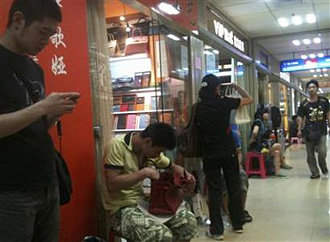
|  |  |  Technology News Technology News  
Faked in China: Inside the Pirates' Web - Part 5
 Doug Palmer & Melanie Lee - Reuters Doug Palmer & Melanie Lee - Reuters
go to original
October 26, 2010


| | Shopkeepers selling fake bags wait for customers outside stores at Baiyun World Leather Market in the southern Chinese city of Guangzhou, September 29, 2010. (Reuters/Tyrone Siu) |  |
ORGANISED CRIME LINKS

While it often seems the counterfeit industry in China is mostly Mom and Pop, Washington sees the problems caused by fake goods as much bigger and more sinister than many imagine. "Counterfeiting and piracy is increasingly the focus of organized crime," said Morton, who heads ICE, the U.S. government's second-largest criminal investigation agency after the FBI.

"There's a lot of money in it and you need a fairly sophisticated operation to pull it off. You need an ability to manufacture goods on a grand scale, you need a shipping network," Morton said in an interview in his office at ICE headquarters with a view of the Washington Monument and Potomac River.

"It literally affects every segment of American manufacturing and business," he continued, ticking off examples: "Counterfeit aircraft engine parts, counterfeit ball bearings for machines, counterfeit pharmaceuticals, counterfeit electronics."

The Internet has made it much easier for unscrupulous companies to sell fake or pirated goods. "You don't have to go to the corner of Fourth and Main to buy your fake Gucci handbag. You can order it over the Internet," Morton said.

Counterfeit products are also increasingly sophisticated and hard to distinguish from the real thing. In the old days, Morton said, everyone knew an item was a knock-off because it looked like a cheaper version of the original. But now, counterfeiters want to mimic the item as closely as possible to get higher prices and profits.

One new tool Washington hopes will help in the international fight is a proposed Anti-Counterfeiting Trade Agreement. Negotiators from the United States, the 27 nations of the European Union, Japan, Australia, Canada, South Korea, Mexico, Morocco, Singapore and Switzerland reached a tentative agreement in late September on the pact, which has been years in the making.

With support from groups such as the U.S. Chamber of Commerce and the Business Software Alliance, Congress is preparing legislation giving the U.S. Justice Department broad new powers to take down "rogue websites," both at home and overseas.

"Sites like this one (ericwhy.com) are stealing the ideas and designs of legitimate, hardworking manufacturers to line the pockets of foreign criminal networks," said Rob Calia, senior director for counterfeiting and piracy at the U.S. Chamber.

"It's theft, plain and simple, and it's hurting our economy."

INTERNET CHAT ROOMS

It is on the Internet where counterfeit traders in China are finding a growing market, not to mention a safer place from which to deal. Chat rooms on sites such as thefashionspot.com are dedicated solely to finding suppliers and discussing bags. Other sites such as Replica Underground offer members direct links to Chinese suppliers.

The consensus in the chat rooms is that the best quality fakes that can be bought from websites come from Jacky, Catty and Joy - all pseudonyms.

Joy, 30, started selling fake Louis Vuittons as a sideline. Having spent a couple of years overseas, she banters with potential customers on her website in flawless English. But behind the cheery facade is a troubled pirate.

"I am worried every day about being caught," Joy told Reuters in an email interview. "The old Chinese saying goes: It's a dagger hanging on top of my heart. I've been trying to get out of the business since day one. I have tried everything. I even started my own brand, but nothing sells like replicas," she said.

Catty, who has been in the business of making "mirror-image" Chanel bags for six years, sells 2,000 to 3,000 bags a month to customers all over the world, for about $100 each. Under Chinese law, that size of operation surpasses the threshold required to begin a criminal investigation, as opposed to a civil fine.

"Yes, I am so afraid of getting caught, but in China many, many people do this job. You can find many people doing my job on iOffer, Taobao and Ebay," Catty said in an email interview, referring to online auction sites.

|

 |
|  |



